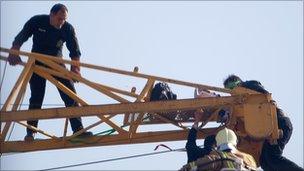Iran police fire tear gas at opposition rally in Tehran
- Published
Footage of the protests in Tehran was captured on mobile phones
Thousands of opposition supporters have clashed with security forces in the centre of the Iranian capital, Tehran.
Police used tear gas and detained dozens rallying in solidarity with uprisings in Egypt and Tunisia. There was one report of a death in Tehran.
The BBC also received reports of similar protests being held in the cities of Isfahan, Mashhad and Shiraz.
Earlier, the police placed opposition leader Mir Hossein Mousavi under house arrest, according to his website.
It said the move was intended to prevent the former prime minister attending the march in Tehran, which the authorities had prohibited. The road leading to Mr Mousavi's house was also blocked by police vans.
Fellow opposition leader Mehdi Karroubi, a former speaker of parliament and a senior cleric, is also reportedly under de facto house arrest.
Both men disputed the re-election of President Mahmoud Ahmadinejad in June 2009, which triggered mass protests that drew the largest crowds in Iran since the Islamic Revolution in 1979. The demonstrations eventually led to a brutal crackdown.
The opposition says more than 80 of its supporters were killed over the following six months, a figure the government disputes. Several have been sentenced to death, and dozens jailed.
Paintball shooting
In their first major show of dissent since Ashura in December 2009, when eight people were killed, thousands of opposition supporters defied the government ban and gathered at Tehran's Azadi Square on Monday, chanting, "Death to dictators".
Riot police and plain-clothes police backed by the elite Republican Guard used tear gas to disperse the protesters, he adds.
Police also fired paintball guns at the demonstrators and beat some with batons.
The fiercest clashes were reported on Azerbaijan Street, close to Azadi Square, and a number of ambulances were seen coming and going. Witnesses told the Associated Press news agency that at least three protesters were wounded by bullets, with dozens of others beaten by the security forces and taken to hospital.
Iran's semi-official Fars news agency reported that one person had been shot dead by protesters and several others wounded.
Mr Mousavi's website, Kaleme.com, said that - according to unconfirmed reports - "hundreds of protesters" had been arrested. There has been no official confirmation, but witnesses told BBC Persian that dozens had been taken away in police vans from the area.
Police also later surrounded Tehran University and Sharif University, and the houses of former President Mohammad Khatami and Abdollah Nuri, a former interior minister and head of Tehran City Council.
As night fell, riot police remained deployed in central Tehran, but the protesters dispersed. The local electricity supply was also cut.
Earlier, an activist wearing a green headband - the colour of the main opposition movement - was detained after he climbed a tall crane in the capital and began inviting people to attend Monday's demonstration.
Clinton slams 'hypocrisy'
Although Iran's establishment officially supports the Egyptian protests, it says the rallies in Iran are a "political move" by opposition leaders.

A man who climbed a crane in Tehran was arrested
In anticipation of the rally, the authorities stepped up security in the capital, blocked access to internet sites, and started jamming satellite news channels. Police helicopters also hovered overhead.
Analysts say Tehran is trying to stop opposition groups from using the Egypt rally as a means to re-ignite anti-government protests of 2009.
Both the Iranian government and the opposition have claimed credit for the recent popular uprisings in Tunisia and Egypt.
The government says the mass protests were inspired by Iran's 1979 revolution, while the opposition says its 2009 protests encouraged the unrest. The opposition also says peaceful rallies do not need permission.
US Secretary of State Hillary Clinton hailed the courage and aspirations of the protesters, and spoke of the Iranian government's "hypocrisy".
"We are against violence and we would call to account the Iranian government that is once again using its security forces and resorting to violence to prevent the free expression of ideas from their own people," she told reporters in Washington.
"Secondly, we support the universal human rights of the Iranian people. They deserve to have the same rights that they saw played being out in Egypt and that are part of their own birthright."
"And thirdly, we think that there needs to be a commitment to open up the political system in Iran, to hear the voices of the opposition and civil society," she added.
Turkish President Abdullah Gul, who is on a visit to Iran, earlier warned that "when leaders and heads of countries do not pay attention to the demands of their nations, the people themselves take action to achieve their demands".
BBC Tehran correspondent James Reynolds says the demonstrations make one key point - the opposition Green Movement is still alive, but it is not yet clear if it poses a serious threat to Iran's establishment.
- Published14 February 2011
- Published10 February 2011
- Published11 February 2011
- Published3 February 2011